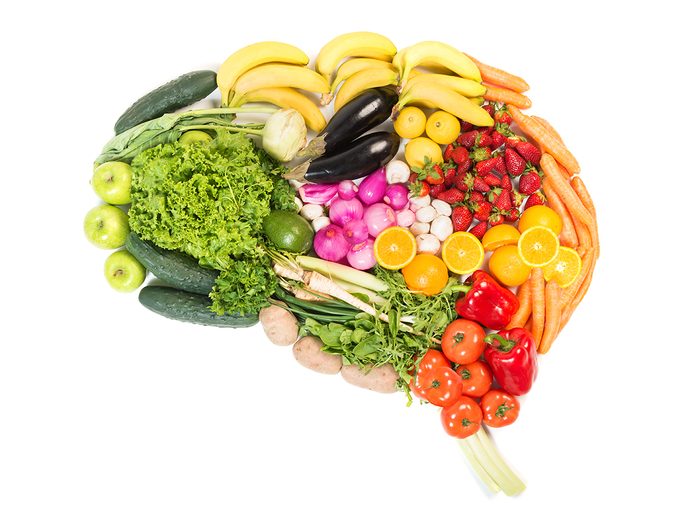
Everyday habits that boost your brain
Thanks to modern advancements in brain imaging, scientists now know we have the power to shape our minds—literally.
London cab drivers, who spend years memorizing city streets, have expanded hippocampi, the brain’s memory motor. Meanwhile, violinists’ brains contain more grey matter in the part connected to the hand that manipulates the strings than the one that simply holds the bow.
And it isn’t just people who’ve mastered a skill who experience such brain changes. According to Harvard researchers, people who practised 45 minutes of meditation every day for two months exhibited decreased grey matter in their amygdala, the area related to anxiety and stress. Even something as basic as getting regular exercise shores up our brain’s memory centre.
These kinds of changes can happen at any age. In fact, the minds of people who make brain-healthy choices can function as if they were 10 years younger—and those habits can contribute significantly reducing your risk of dementia.
Now that we know our genes, and our age, don’t have to determine mental decline, what can you do to boost your brain?

Choose foods that boost your brain
While there isn’t a miracle food or supplement that can instantly make you smarter, changing your eating patterns can definitely affect your brain health. Here’s what to put on your plate:
Leafy green vegetables—think spinach, kale and arugula—are rich in brain-boosting folate, antioxidants and vitamin K. A study from Chicago’s Rush University Medical Center found that eating just one serving of these a day is enough to preserve your current cognitive function—and people who ate more had a brain as strong as those 11 years younger.
Nuts, particularly tree nuts like almonds and walnuts, are a good source of omega-3s. Those unsaturated fatty acids help provide the building blocks for new brain cells and are thought to reduce inflammation, which is linked to memory loss. Nuts are also rich in vitamin E and niacin—both brain-saving minerals.
Fish oil—especially from salmon, trout and sardines—is another excellent source of omega-3s. (This is the healthiest fish you can eat.)
Berries appear to slow cognitive decline. According to a 2012 Harvard analysis of the Nurses’ Health Study, women who ate two or more servings a week of strawberries and blueberries had brains that appeared 2.5 years younger than those who didn’t. Researchers think that’s because berries are a good source of flavonoids—natural antioxidants and anti-inflammatory chemicals that help relax your blood vessels.
Avoid salt and fats. “What’s good for the heart is good for the brain,” says Guylaine Ferland, a professor in the department of nutrition at the University of Montreal. That’s because a healthy ticker sends blood—and oxygen—to the brain. So when it comes to consuming high-fat foods like red meat, cheese and anything fried, moderation is key. Also, since high blood pressure and weight gain are risk factors for cognitive decline, it’s best to avoid eating too many high-sodium or highly processed foods, like sugary drinks, frozen desserts and fast food.
These are the worst foods for your brain.

Get more exercise
Your brain is made up of about 100 billion neurons—the cells that transmit information throughout your body—and exercise is key for creating a fertile environment for them. As physical activity increases the flow of blood and oxygen to your brain, your body releases special proteins called neurotrophic factors that help neurons grow and live longer.
A 2012 University of British Columbia study reported even more specific benefits: aerobic exercise, researchers found, expands the area of your brain related to memory and learning.
Regular exercise also lowers your risk of developing dementia, especially if you start doing it in your 40s or 50s. “Midlife is a critical window for promoting your brain health, because so many of our chronic conditions start then,” says Teresa Liu-Ambrose, Canada Research Chair and director of the Aging, Mobility, and Cognitive Neuroscience Laboratory at UBC.
In fact, establishing a workout routine before you’re 55 reduces the risk of developing dementia by 30 per cent, and of developing Alzheimer’s disease by 45 per cent. (But it’s never too late! People as old as 80 still see cognitive gains when they start exercising.)
Learn how to spot the early signs of dementia.

Find time for relaxation
When your body believes you’re in danger—whether that’s from a true threat, like a near-miss collision, or a false one, like a fear-mongering clickbait headline—the amygdala area of your brain activates your fight-or-flight response. This was useful for our ancient ancestors when they needed a boost of cortisol to escape a predator, and it can still be handy today to avoid an accident. But an overuse of the fight-or-flight pathways in your brain can make them easier to trigger—sending you into a state of anxiety over smaller matters.
The good news is, it also works the other way. Spending more time in a relaxed, loving state of mind makes those positive emotions easier to access as well. The brains of people who regularly practise meditation have more density in areas related to memory, sense of self and empathy. And their amygdalae are less dense, too. “Mindfulness meditation reduces not only the stress in the moment, but the threshold of what stresses you out in general,” says Sean Finnell, co-founder of Toronto’s Mindset Brain Gym.
Meditation isn’t the only way to calm the mind, of course. “There are a lot of different roads to this,” says Daniel Levitin, a neuroscientist and the author of Successful Aging. He says people who socialize more, nurture their hobbies and participate in activities that are meaningful to them, like volunteering, are all less likely to be stressed. For those with chronic anxiety, starting therapy can be useful as well.
Overall, spending more time in a relaxed state can help “rewire the brain for a slower pace and a more focused energy,” says Levitin.
Explore more healthy ways to cope with stress.

Meditate for two minutes every day
Starting a new meditation routine can seem daunting, but Mindset Brain Gym’s Sean Finnell has a mindfulness exercise that can be done on the subway or at the office—anywhere you can go internal for at least a couple of minutes.
- Close your eyes and bring your full attention to the sensation of your breath going in and out of your nose.
- When you find you’re thinking about something other than your breath—which happens to even the most veteran meditators—don’t try to ignore it. Instead, just notice the thought. “With meditation, we realize that we are not our thoughts, we are just observing our thoughts. So instead of ‘I am anxious right now,’ it’s ‘anxiety is coming up right now,’” explains Finnell.
- Label your thoughts. “Give the thought a category, like a hashtag: that’s work, that’s family.”
- Return your attention to your breath to bring yourself back to the present moment. Repeat until your time is up.
Here’s what can happen when you start meditating every day.

Optimize your sleep
According to Statistics Canada, more than one third of Canadians are chronically sleep deprived—and that’s bad news for our brains, which perform worse after even a single night of inadequate rest. Sleep not only cleans the brain of unneeded by-products from its daily functioning, it’s also crucial for encoding new impressions and knowledge into your long-term memory.
In a University of California San Diego study, researchers found that well-rested participants remembered twice as many new vocabulary words as those who didn’t get enough sleep. And when it comes to our motor skills, they drop in speed by 20 per cent when we’ve underslept.
If you’re having a difficult time getting the recommended seven to nine hours of shut-eye a night, doctors recommend assessing your daily sleep routine.
Are you keeping to a schedule?
Go to bed and wake up at the same time every day, even on weekends. When you rise, open your blinds so the sun can kick-start your circadian rhythm, the inner clock that regulates your level of wakefulness throughout the day and night. Limit naps to 30 minutes a day. (Here’s expert advice on how to fix your sleep schedule.)
What are you consuming?
Avoid caffeine after lunch. And while drinking alcohol before bedtime can help put you to sleep, it increases the chance you’ll wake up in the middle of the night. That’s because it increases the production of a chemical called adenosine, which makes you groggy—but only temporarily. When the adenosine wears off, you wake up. (Make sure you never eat this before bed.)
Do you make time for shutting down?
Two hours before bedtime, stop using screens—the blue light they emit can confuse your body, causing it to produce less melatonin, a hormone that makes us sleepy. Instead, create a relaxing ritual to end your day, like reading or having a shower.
Is your room conducive to sleep?
Channel your ancient ancestors by thinking of your bedroom as a cave. It should be cool, dark and quiet.
Discover 12 secrets to a good night’s sleep.

The best apps to boost your brain
Our brains need challenging tasks to stay sharp. And thankfully, there’s an app for that—many, actually. Alvaro Fernandez, CEO of market-research firm SharpBrains, suggests trying ones other than the games you usually play. “If you’re doing something that brings novelty, variety and a level of effort, you’re on the right path.”
Here are three apps to get your brain going—and three more to help it gear back down.
BrainHQ: This app serves up short tests to identify your weak spots—be it attention, memory or brain speed—and then offers suitable games to help you improve. Studies have shown users have the memory of a person 10 years younger, and have an easier time following a conversation in a crowded room.
Lumosity: Launched in 2007, this popular app with over 100 million users offers dozens of games and puzzles that focus on different brain skills. Completing tangram puzzles will help build your problem-solving abilities, matching games boost memory, and re-ordering numbers hones your mastery of math.
Cognifit: This app offers fun brain games that help boost a dozen skills, including concentration, memory, reasoning and coordination. (It even promises to help you become a better driver!) Additionally, Cognifit features tailored regimens for specific conditions, including Parkinson’s, “chemo brain,” depression and ADHD.
Calm: True to its name, Calm contains breathing exercises, three- to 25-minute guided meditation sessions and stories designed to help you fall asleep. Actor Matthew McConaughey voices one such tale, called “Wonder.” (Check out 10 great podcasts to help you sleep.)
Headspace: This app has hundreds of guided meditations for every need: two-minute mini-sits, SOS sessions for moments of serious stress and versions for walks. For the end of the day, Headspace offers 45-minute podcasts that use calming visualizations and sounds to help you nod off.
10% Happier: Inspired by ABC news anchor Dan Harris’ bestselling book, this app includes more than 500 guided meditations, as well as short videos to keep you motivated—and the option to text with a coach.
Next, find out how to boost your brain by following the MIND Diet meal plan.